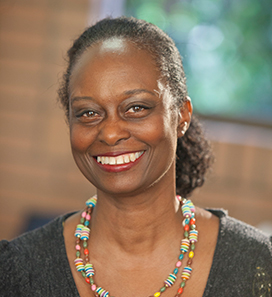
Donna Benton, director of the USC Family Caregiver Support Center
From challenges posed by the COVID-19 pandemic to policy proposals introduced during a tense election year, the needs of family caregivers are making news. Expert Donna Benton, director of the USC Family Caregiver Support Center and research associate professor at the USC Leonard Davis School of Gerontology, says this recent national attention is long overdue.
“Twenty-three percent of caregivers say that just by being a family caregiver, their health has been made worse,” Benton says. “And why is that? Because they’re taking their relatives to the doctor, [but] they’re not going to the doctor themselves for their own health care because they may not have time to do it. They have to make a choice: I can either get my relative, who is sicker than I am, to the doctor, or I can go to work. Or I can use my sick time for me. Having to make those kinds of choices means that we really need to have better policies overall for long-term care services and supports in our communities.”
Here are some of Benton’s suggestions for what caregivers need and how to bring about better supports, services and policies:
Build in breaks for caregivers.
“What we can do for caregiving is have policies that help relieve some of that care when we’re not able [to do the caregiving]— so that we don’t always have to make a choice between, say, a paycheck and caring for someone, going in sick to work and caring for our relative, being able to sleep and caring for our relative. So we need to have built-in policies that allow for breaks and allow for alternatives when we choose to have them there. All of those things may not be a direct [payment] to the caregiver, but they provide more options for care, for both the caregiver and the person they’re caring for.”
Use personal stories to advocate for caregivers.
“People get scared about talking to a legislator or their elected official, and they say, ‘Well, I don’t know how to develop policies.’ Well, you know what? You don’t have to come up with the wording. What you can do is tell your struggle, tell your story, tell not just the struggles but also why you do what you do. And your story will be enough for the policymakers. They’re the ones who need to understand where the gaps are and to understand what your needs are. When you tell your story, all you have to add is, ‘And I wish that someone could do [XYZ].’ Don’t worry if it’s there or not right now. You just give out your wish list.”
Address racial and socioeconomic health disparities.
“The pandemic right now has really just removed that very thin veil that was covering up the disparities in health and in the social determinants of health in our society right now. Racism has always pushed our African-American, Black, Latino and other ethnic and racial groups to the margins in terms of how we’ve set up policies to help them with family care overall. Even when the in-home support services were set up, part of that was that there were not reimbursements for being a caregiver in terms of benefits that you could pay into Social Security or things like that. So people who worked in domestic work never could build up equity for themselves — financial equity.
“And then when it comes to health disparities right now for the African-American community, diseases like Alzheimer’s are considerably higher among that population, and we’re more at risk because of other health disparities. And that all comes down to the fact that we’ve had health policies that have not been equal, and access to health care has not been equal. And so our older adult population might be sicker than other populations. And during this time of COVID, health disparities have just been shown through the fact that we have much higher rates of death and infection among the African-American population. … And we have to look at, you know, where people are living, and do we have enough medical facilities in the neighborhood? Do we have enough adult day cares and child care centers in the neighborhood? Do we have enough grocery stores in the neighborhood? And do we have the right types of food and fresh vegetables and things in the neighborhood?”
Provide better support for dementia caregivers.
“For dementia, the policies need to be there so that we get better diagnoses, so that we have more physicians who are trained to recognize and help family members connect with social services, because the physician isn’t going to be there to help with support groups. They’re not going to become the support group person. They’re not going to help them navigate, so other social services [have to]. But if they make the right referral to, say, an Alzheimer’s Association or AARP or a California Caregiver Resource Center system, that actually helps start the process so that the caregiver will have somebody who they can call whenever they need to. Over the course of many years, as the disease progresses, you’re going to need different training, different information.”
Address caregivers’ mental health needs.
“Almost 50 percent of family caregivers express some form of depression or anxiety, and they could really benefit from being with somebody who really understands caregiving, who can talk to them and help them with their depression or anxiety. Being able to have enough support groups in the neighborhood, having adult day cares — all of those things you can really advocate for.”
Increase investment in social programs.
“The more we invest in our social programs, [the less caregivers and families will need to] use the health care system. So it’s not that you have to suddenly find money; it’s there. It’s where we prioritize it and where we move it.”
Identify as a caregiver.
“Surprisingly, most people don’t even think of themselves [as caregivers]— they say ‘I’m the mother, I’m the daughter, I’m the son, or I’m the spouse,’ but they don’t put ‘and … I’m a caregiver.’ So first you have to self-identify as a caregiver, because the issues are there. People are having to choose between going to work and putting the person they’re caring for at risk because they don’t have enough paid sick time, or they don’t have protected time for work. So once caregivers identify themselves, then they can ask for things like, ‘If I’m caring for someone, can I be more eligible for respite so that I can take a break and have somebody else come in just for safety, so that I can get a little more sleep, so that I can go to my own doctor’s appointments, so that I can just enjoy a meal without interruption for a little while?’ You can look for policies that help with education, so that you feel comfortable and confident in how you’re helping the caregiver.”
2020 Caregiver Conference Promotes Self-Care
The 20th Annual Caregivers Are Learning More (CALM) Conference, “Project Reveal: Celebrating the Caregiver in You,” hosted by the USC Family Caregiver Support Center. The event will feature caregiver stories, legislative updates, meditation and self-care, comedy, dance and fitness activities, cooking demonstrations, and more.
A caregiver is someone who assists another person – usually a family member – who has physical and/or mental limitations. Caregiving allows the person with a condition to stay in the home for as long as possible so they can be cared for safely and comfortably. Although caregiving can be very rewarding, it can also be stressful. There may be times when caregivers feel pressured by the demands of giving care, balancing family obligations, working and taking care of themselves. Occasionally, they may not know where to turn for answers, emotional support, or practical advice on how to get a break from caregiving responsibilities.
Event Info
Friday, November 20th, 3:00-5:00 PM
Saturday, November 21st, 9:00 AM-4:00 PM
The conference has been adapted into a virtual format so we can all stay safe and healthy while connecting with each other. This event will also be live-streamed and translated into Spanish. Learn more and register at https://www.fcsc.usc.edu/20th-annual-calm-conference/.
About the USC Family Caregiver Support Center
Since 1989, the USC Family Caregiver Support Center at the USC Leonard Davis School of Gerontology has placed a high priority on providing support across the continuum of caregiving, including diagnosis, prognosis, services that help maintain the care recipient’s independence and abilities, and helping caregivers care for themselves and manage their own well-being. Supportive services include information, assessment, individual consultations, respite, education, and training. Our vision is: “To be a model for Los Angeles, the state and the nation, by using technology, research, and education to transform caregiving and the long-term care system.” Learn more at fcsc.usc.edu.





